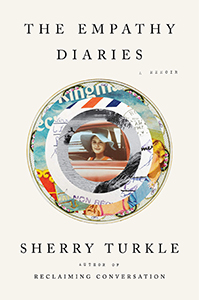 Sherry Turkle, The Empathy Diaries: A Memoir (New York: Penguin, 2021), 357pp.
Sherry Turkle, The Empathy Diaries: A Memoir (New York: Penguin, 2021), 357pp.
For over forty years Sherry Turkle has been the proverbial canary in the coal mine that warns of impending danger. In her new memoir, Turkle, a professor of technology and the social sciences at MIT, and the founding director of the MIT Initiative on Technology and Self, admits that she's been "something of a killjoy in the American love affair with technology."
In her earlier book Alone Together (2011), Turkle explored "why we expect more from technology and less from each other." In Reclaiming Conversation; The Power of Talk in a Digital Age (2015), she documented how we converse less with each other, even as we connect more with technology. In The Empathy Diaries, Turkle recounts her own life story to illustrate how technology changes not only what we do, but who we are, our own inner lives and our relationships with others, with a special focus on the loss of empathy. "But only shared vulnerability and human empathy allow us to truly understand each other."
Turkle insists that technology isn't a neutral tool. It enchants. "It makes us forget what we know about life," and exerts a "seductive undertow" on us. Our captivity to technology degrades almost all of our important human relationships, from dinner table conversations to bath time with your baby to a walk on the beach with your lover. These are just a few of our sacred human moments that are not the time to check our smart phones.
Technology diminishes our capacities for self-reflection and creativity. Increased productivity from multi-tasking is now known to be a myth. Studies show drastic decreases in empathy among college students the last twenty years as measured by standard psychological tests.
There are no simple solutions. What we should look for are new beginnings. That requires us to acknowledge the "profound effects" of technology on us and to admit our vulnerabilities. These are the first steps toward changing our behaviors and living more intentionally with our digital devices. Then, all sorts of small steps become possible, like device-free times and places — no phones at the dinner table.
In Reclaiming Conversation, Turkle suggested that we listen to the experts — if Google's former CEO Eric Schmidt admits that he no longer reads books on airplanes because he's so digitally connected, if the Harvard law professor Carol Steiker now prohibits all digital devices in her classes, and if Steve Jobs and Jonathan Ives (Apple's Chief Design Officer) limited the screen time of their children, then we can follow their own fears and reclaim a significant part of what makes us human — talking to each other.
In the last pages of The Empathy Diaries, Turkle says that "to fix our crisis of intimacy and privacy, of empathy and human connection, we don't need more apps. We need one another. We are the empathy app. And we have the potential to do the right thing when it counts. It's not too late to reshape the digital to serve the human."
Dan Clendenin: dan@journeywithjesus.net


